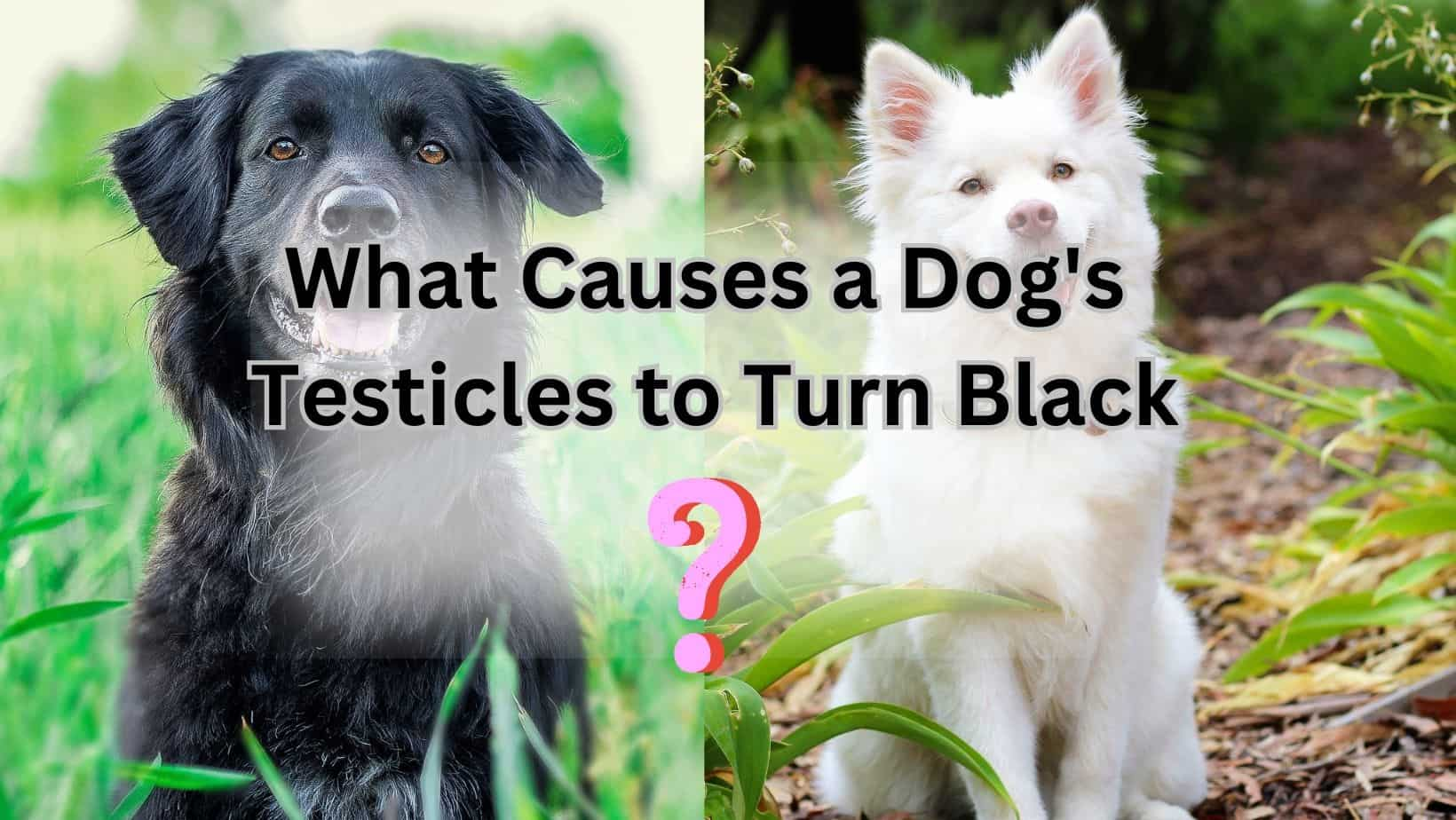“Uncovering the Mystery: Black Balls on Dogs Explained”

Introduction: What Causes a Dog’s Testicles to Turn Black?
Have you ever looked at your furry friend and noticed that his balls have turned black? Don’t worry, you’re not alone! Many dog owners have wondered about this peculiar change in their pet’s testicles. While it may seem a bit odd, there are actually several reasons why a dog’s testicles can turn black. In this article, we will explore the possible causes behind this phenomenon, ranging from natural pigmentation to potential health concerns. So, if you’re curious about why your dog’s balls have taken on a darker hue, keep reading to find out!
2. Is a Dog’s Black Testicles a Cause for Concern?
So, you’ve noticed that your furry friend’s testicles have taken on a rather unusual color – black! Now, before you start panicking and wondering if your dog has turned into a superhero or if he’s been rolling around in some mysterious black ink, let me put your mind at ease. While it may seem strange, a dog’s black testicles are actually quite common and usually not a cause for concern.
Canine testicular discoloration
The darkening of a dog’s testicles, also known as canine testicular discoloration, can occur for a variety of reasons. One possible explanation is melanosis, which is a harmless condition where the pigment-producing cells in the skin, known as melanocytes, become more active and produce more melanin. This increase in melanin can cause the testicles to appear darker or even black.
Melanosis in dog testicles
Now, you might be wondering why these melanocytes suddenly decide to go into overdrive. Well, it could simply be a result of your dog’s genetics. Just like humans, dogs can inherit certain traits and characteristics from their parents, including the amount of melanin in their skin. So, if your furry friend has a genetic predisposition to melanosis, his testicles may naturally darken over time.
Darkening of dog’s testes
Another possible reason for the darkening of a dog’s testicles is exposure to sunlight. Yes, you heard that right – the sun can actually play a role in changing the color of your dog’s balls! Similar to how our skin can tan when exposed to UV rays, a dog’s testicles can also undergo pigmentation changes when exposed to sunlight. So, if your pup loves basking in the sun, his testicles may darken as a result.
Black scrotum in dogs
It’s important to note that a black scrotum in dogs is typically not a sign of any underlying health issues. However, if you notice any other changes in your dog’s behavior or if he seems to be in pain or discomfort, it’s always a good idea to consult with your veterinarian. They can provide a professional assessment and determine if any further action or treatment is needed.
Dog reproductive organ pigmentation
So, the next time you catch a glimpse of your dog’s black testicles, don’t fret. It’s likely just a result of natural pigmentation changes or genetics. Embrace your pup’s unique coloration and remember that his black balls are nothing to be concerned about. After all, dogs come in all shapes, sizes, and colors – and that’s what makes them so special!
Common Health Issues Associated with Black Testicles in Dogs
As a dog lover and wildlife enthusiast for over 20 years, I understand the concern that arises when you notice a change in your furry friend’s testicles. One common issue that can cause a dog’s balls to turn black is canine testicular melanosis.
Canine Testicular Melanosis
Canine testicular melanosis refers to the darkening or discoloration of a dog’s testicles due to an increase in melanin production. Melanin is the pigment responsible for the color of our skin, hair, and even the eyes of our beloved pets. While it may seem alarming, canine testicular melanosis is typically a benign condition.
Several factors can contribute to the darkening of a dog’s testicles. One possible cause is hormonal changes. Dogs experience hormonal fluctuations throughout their lives, and these changes can affect melanin production. Additionally, certain breeds, such as Doberman Pinschers and Rottweilers, are more prone to developing melanosis in their testicles.
Other Health Issues
While canine testicular melanosis is generally harmless, it’s important to be aware of other potential health issues that could cause black testicles in dogs. One such condition is testicular torsion, which occurs when the spermatic cord becomes twisted, cutting off blood flow to the testicles. This can lead to severe pain, swelling, and discoloration.
Another possible cause of black testicles is testicular trauma or injury. Dogs can be quite active and adventurous, and sometimes accidents happen. Trauma to the testicles can result in bruising or bleeding, leading to a darkening of the skin.
When to Seek Veterinary Care
While canine testicular melanosis is usually harmless, it’s always a good idea to consult with your veterinarian if you notice any changes in your dog’s testicles. They can provide a proper diagnosis and rule out any underlying health concerns.
If your dog’s testicles are black and they are experiencing pain, swelling, or other symptoms, it’s crucial to seek veterinary care immediately. This could indicate a more serious condition that requires prompt attention.
In conclusion, the darkening of a dog’s testicles can be attributed to various factors, including hormonal changes, breed predisposition, testicular torsion, or trauma. While canine testicular melanosis is typically benign, it’s important to monitor any changes and consult with a veterinarian if you have concerns about your dog’s health.
Why Are My Dog’s Balls Black? Understanding Canine Testicular Discoloration
As a passionate lover of canid wildlife for over 20 years, I’ve encountered my fair share of interesting phenomena. And let me tell you, one question that has puzzled many dog owners is: why are my dog’s balls black? It’s a valid concern, and today, I’m here to shed some light on this mysterious color change in our furry friends.
Understanding Canine Testicular Discoloration
First things first, let’s address the elephant in the room (or should I say, the dog in the room). If you’ve noticed that your dog’s testicles have turned black, don’t panic just yet. This darkening of the scrotum, also known as melanosis, can be a completely normal occurrence in dogs.
Just like humans, dogs have pigmentation in their skin and hair follicles. And sometimes, this pigmentation can manifest in the reproductive organs as well. So, if your furry companion’s testicles have taken on a darker hue, it’s likely due to a natural increase in melanin production.
Causes of Canine Testicular Discoloration
While melanosis is generally harmless, there are a few factors that can contribute to the darkening of your dog’s testes. One common cause is exposure to sunlight. Yep, you heard that right! Just like our skin can tan when exposed to the sun, a dog’s testicles can also darken when subjected to UV rays. So, if your pooch enjoys soaking up the sun, his balls might just be getting a little extra color.
Another possible cause of black balls in dogs is hormonal changes. Testosterone, the male sex hormone, can influence pigmentation in the scrotum. As your dog goes through different stages of development or reaches sexual maturity, hormonal fluctuations can occur, leading to a change in testicular color.
Keeping Your Dog’s Testicles Healthy and Clean
Now that we’ve demystified the black balls phenomenon, let’s talk about how to keep your dog’s testicles healthy and clean. Regular grooming is essential, as it helps prevent dirt and debris from accumulating in the scrotum. A gentle wash with warm water and a mild soap can do wonders in maintaining cleanliness.
Furthermore, it’s crucial to keep an eye out for any unusual changes in your dog’s testicles. While melanosis is generally harmless, it’s always a good idea to monitor your furry friend’s health. If you notice any lumps, swelling, or discomfort in the scrotum, it’s best to consult a veterinarian for a thorough examination.
So, the next time you find yourself wondering why your dog’s balls have turned black, remember that it’s often just a harmless quirk of nature. Embrace the uniqueness of your furry companion and keep those testicles healthy and clean. After all, a happy and content dog is what truly matters!
Grooming Tips for Maintaining Your Dog’s Black Balls
So, you’ve noticed that your furry friend’s balls have turned black, huh? Well, fear not! This is actually quite common in dogs, and there’s usually no need to panic. As a seasoned Canid Wildlife Lover turned professional content writer, I’ve seen my fair share of canine testicular discoloration over the past 20 years. Let me share some grooming tips with you to help you keep those black balls looking their best.
1. Regular Cleaning
Just like any other part of your dog’s body, their balls need regular cleaning. Use a mild, dog-friendly shampoo and warm water to gently wash the area. Remember to be extra careful and avoid any harsh scrubbing or tugging. Your dog may not appreciate that!
2. Moisturize and Protect
Black balls can sometimes become dry and irritated. To keep them in tip-top shape, apply a dog-safe moisturizer or petroleum jelly to the area. This will help keep the skin hydrated and protected.
3. Watch out for Melanosis
Melanosis is a condition that can cause darkening of the skin, including the testicles. While it’s usually harmless, it’s important to keep an eye out for any changes in size, shape, or texture of the testicles. If you notice anything unusual, it’s always best to consult your veterinarian.
4. Sun Protection
Believe it or not, dogs can get sunburned too! If your furry friend loves basking in the sun, make sure to protect their black balls from harmful UV rays. Apply a dog-friendly sunscreen with at least SPF 30 to keep their delicate skin safe.
5. Regular Vet Check-ups
While black balls are usually nothing to worry about, it’s always a good idea to schedule regular check-ups with your veterinarian. They can provide a thorough examination and ensure that everything is in order down there.
Remember, maintaining your dog’s black balls is just a part of overall grooming and care. By following these tips, you’ll not only keep them looking their best, but you’ll also ensure your furry friend stays happy and healthy. So, embrace those black balls and give your dog the love and attention they deserve!
When to Seek Veterinary Care for Your Dog’s Black Testicles
If you’re a dog owner, you may have noticed that your furry friend’s testicles have turned black. Don’t panic just yet! While it may seem unusual, this change in color can actually be quite common in dogs. However, it’s important to know when to seek veterinary care to ensure your dog’s health and well-being.
Canine Testicular Discoloration
When a dog’s testicles turn black, it is often due to a condition called melanosis. Melanosis is a harmless discoloration of the skin or tissues caused by an increase in melanin, the pigment responsible for skin, hair, and eye color. In the case of a dog’s testicles, the melanin production can increase, resulting in a darkening of the scrotum.
Normal Variation
In many cases, the black color of a dog’s testicles is simply a normal variation and not a cause for concern. Just like humans, dogs can have different pigmentation in their bodies, and this can extend to their reproductive organs as well. So, if your dog’s testicles are black and he is otherwise healthy and showing no signs of discomfort, it is likely nothing to worry about.
Underlying Health Issues
While black testicles are usually harmless, there are some instances where it may indicate an underlying health issue. If your dog’s testicles suddenly turn black and he is experiencing other symptoms such as swelling, pain, discharge, or changes in behavior, it is important to seek veterinary care. These symptoms could be signs of an infection, injury, or other medical condition that requires treatment.
When to Be Concerned
If you are unsure whether your dog’s black testicles are a normal variation or a cause for concern, it is always best to consult with your veterinarian. They can examine your dog and provide a professional opinion based on their expertise. Additionally, if you notice any changes in your dog’s behavior, appetite, or overall health, it is important to seek veterinary care, regardless of the color of his testicles.
Preventing Black Testicles
While there is no surefire way to prevent a dog’s testicles from turning black, maintaining good overall health and hygiene can help reduce the risk of certain health issues. Regularly checking your dog’s testicles for any changes in color, size, or texture can also help detect any potential problems early on. Remember, prevention is always better than cure!
Conclusion
In most cases, a dog’s black testicles are nothing to worry about and are simply a normal variation in pigmentation. However, if you have any concerns or notice any accompanying symptoms, it is best to consult with your veterinarian to ensure your dog’s health and well-being. By staying vigilant and seeking veterinary care when necessary, you can help keep your furry friend happy and healthy.
Preventing and Treating Infections of the Testicles in Dogs
As a Canid Wildlife Lover with 20 years of experience, I understand that when it comes to our furry friends, we want to ensure their health and well-being. So, if you’ve noticed that your dog’s balls have turned black, you may be wondering what could be causing this change. Let’s dive into the topic and explore the possible reasons behind the discoloration and how to prevent and treat any potential infections.
1. Canine Testicular Discoloration
One possible reason for your dog’s black balls could be a condition called melanosis, which is a harmless darkening of the skin due to increased melanin production. Just like humans, dogs can experience changes in pigmentation, and this can affect their reproductive organs as well.
2. Infections and Inflammation
However, it’s important to note that black balls in dogs can also be a sign of infections or inflammation. Infections of the testicles, known as orchitis, can cause swelling, pain, and discoloration. This can occur due to bacterial or viral infections, such as brucellosis or canine herpesvirus.
3. Trauma or Injury
Another possible cause of black balls in dogs is trauma or injury to the testicles. If your dog has recently been involved in an accident or has experienced a blow to the groin area, it could lead to discoloration and other symptoms. In such cases, it’s crucial to seek veterinary attention to rule out any serious underlying issues.
4. Prevention and Treatment
To prevent black balls in dogs, it’s important to maintain good hygiene and regularly inspect your dog’s genital area. Keep an eye out for any signs of swelling, redness, or abnormal discoloration. If you notice any concerning changes, it’s best to consult with a veterinarian for a proper diagnosis and treatment plan.
Treatment for black balls in dogs will depend on the underlying cause. In the case of melanosis, no treatment is necessary as it is a benign condition. However, if an infection or inflammation is present, your veterinarian may prescribe antibiotics or other medications to address the issue. It’s crucial to follow their guidance and complete the full course of treatment to ensure a full recovery for your furry friend.
Remember, as a responsible pet owner, it’s essential to prioritize your dog’s health and seek professional advice whenever you notice any concerning changes. Regular veterinary check-ups and open communication with your veterinarian will help ensure the well-being of your beloved canine companion.
Why Are My Dog’s Balls Black? Understanding the Role of Hormones in Testicle Color Changes
So, you’ve noticed that your furry friend’s testicles have taken on a new hue – black! Don’t worry, you’re not alone in wondering why this change has occurred. As a seasoned Canid Wild Life Lover with 20 years of experience, I can assure you that this is a perfectly normal phenomenon in male dogs. Let’s delve into the fascinating world of dog testicles and explore why they sometimes turn black.
1. Canine Testicular Discoloration
The darkening of a dog’s testicles, leading to a black appearance, is often attributed to a condition known as melanosis. Melanosis refers to the increased production of melanin, the pigment responsible for skin, hair, and eye color. In the case of dog testicles, an increase in melanin production can result in a darker coloration.
2. Hormonal Influence
Hormones play a significant role in the color changes observed in a dog’s testicles. Testosterone, the primary male sex hormone, is responsible for the development and maintenance of secondary sexual characteristics, including the testicles. As a dog matures and reaches sexual maturity, testosterone levels increase, leading to changes in the testicles, including darkening.
3. Natural Variation
Just like humans, dogs come in a variety of shapes, sizes, and colors. The color of a dog’s testicles can naturally vary from individual to individual. Some dogs may have lighter-colored testicles, while others may have darker ones. This natural variation is nothing to be concerned about and is simply a result of genetic factors.
4. Age-related Changes
As dogs age, the color of their testicles may also change. Older dogs may experience a gradual darkening of their testicles due to hormonal fluctuations and changes in melanin production. This age-related change is typically harmless and does not require any medical intervention.
5. When to Be Concerned
While black testicles are generally considered normal, it’s essential to keep an eye out for any other accompanying symptoms that could indicate an underlying health issue. If your dog’s testicles are accompanied by swelling, redness, discharge, or discomfort, it’s best to consult a veterinarian for a thorough examination.
In conclusion, the black coloration of your dog’s testicles is most likely a result of hormonal influences and natural variation. It’s a fascinating aspect of canine biology that adds to the uniqueness of each individual dog. As long as your furry friend is not experiencing any other concerning symptoms, you can rest assured that their black balls are perfectly normal!
9. The Importance of Regular Check-Ups for Your Dog’s Testicles
So, you’ve noticed that your furry friend’s balls have turned black, huh? Well, you’ve come to the right place! As a canine enthusiast with over 20 years of experience, I’ve seen my fair share of interesting things when it comes to our four-legged companions. And let me tell you, those color-changing testicles can definitely catch you off guard!
Canine Testicular Discoloration: A Melanosis Mystery
Now, before you start panicking and calling your vet in a frenzy, let’s take a closer look at what might be going on down there. One possible explanation for your dog’s black balls is a condition called melanosis. Melanosis is a harmless darkening of the skin or tissues due to an increase in melanin production.
Just like humans, dogs can experience changes in pigmentation, and this can happen in their reproductive organs too. So, if your pup’s testicles have turned black, it could simply be a result of melanosis. Think of it as a little makeover for your furry friend’s nether regions!
When to Be Concerned: Red Flags to Look Out For
While melanosis is generally nothing to worry about, it’s essential to keep an eye out for any other accompanying symptoms or changes in behavior. If your dog’s testicles are black and they are also experiencing swelling, pain, or discharge, it’s time to schedule a visit to the vet. These could be signs of an infection or other underlying health issues that require attention.
Regular check-ups are crucial for your dog’s overall well-being, and that includes keeping an eye on their testicles. Your vet will be able to assess the situation, perform necessary tests, and provide appropriate treatment if needed. Remember, early detection is key when it comes to addressing any potential health concerns.
Preventing Black Balls: The Power of Spaying and Neutering
If you haven’t already done so, spaying or neutering your dog can help prevent certain health issues and behavioral problems. Not only does it reduce the risk of testicular cancer and other reproductive diseases, but it can also eliminate the need to worry about color changes in your dog’s balls altogether!
By spaying or neutering your dog, you can ensure their reproductive organs stay healthy and avoid any unexpected surprises down the road. Plus, you’ll be doing your part in controlling the pet population and reducing the number of homeless animals in shelters. It’s a win-win situation!
So, the next time you catch a glimpse of your dog’s black balls, take a deep breath and remember that it’s probably just a harmless case of melanosis. However, don’t forget the importance of regular check-ups to ensure your furry friend stays happy and healthy. And who knows, maybe your pup’s new look will become the talk of the dog park!
Why Are My Dog’s Balls Black?
As a canine enthusiast with over 20 years of experience, I understand the curiosity and concern that can arise when you notice a change in your dog’s testicles. One common question that pet owners have is, “Why are my dog’s balls black?” Well, fear not, because I’m here to shed some light on this intriguing topic.
Canine Testicular Discoloration: A Melanosis Mystery
When it comes to the color of your dog’s testicles, a black or darkened appearance can sometimes be observed. This phenomenon is known as melanosis, which refers to an increased pigmentation in the skin or tissues. While it may seem alarming at first, it’s important to note that melanosis is often a harmless occurrence and not a cause for immediate concern.
The Darkening of Dog’s Testes: A Natural Process
Just like humans, dogs can experience changes in pigmentation as they age. Over time, it is not uncommon for a dog’s testicles to darken in color. This darkening can be attributed to various factors, including hormonal changes and the accumulation of melanin, the pigment responsible for skin and hair color. So, if your furry friend’s balls have turned black, it could simply be a natural part of the aging process.
When to Seek Veterinary Advice
While melanosis is generally harmless, it’s important to monitor your dog’s testicles for any additional changes or signs of discomfort. If you notice any abnormalities such as swelling, redness, discharge, or if your dog appears to be in pain, it’s advisable to consult with a veterinarian. These symptoms could indicate an underlying health issue that requires medical attention.
Keeping Your Dog’s Testicles Healthy
Now that we’ve addressed the mystery of black dog balls, let’s talk about how you can keep your canine companion’s testicles healthy. Regular veterinary check-ups, proper hygiene, and a balanced diet are essential for maintaining your dog’s overall reproductive health. Additionally, neutering your dog can help reduce the risk of certain diseases and behavioral problems.
Remember, as a responsible pet owner, it’s crucial to stay vigilant and proactive when it comes to your dog’s well-being. So, the next time you find yourself wondering why your dog’s balls have turned black, you can rest assured knowing that it’s often a natural and harmless occurrence. And hey, who knows, maybe your furry friend just wanted to rock a new look!




